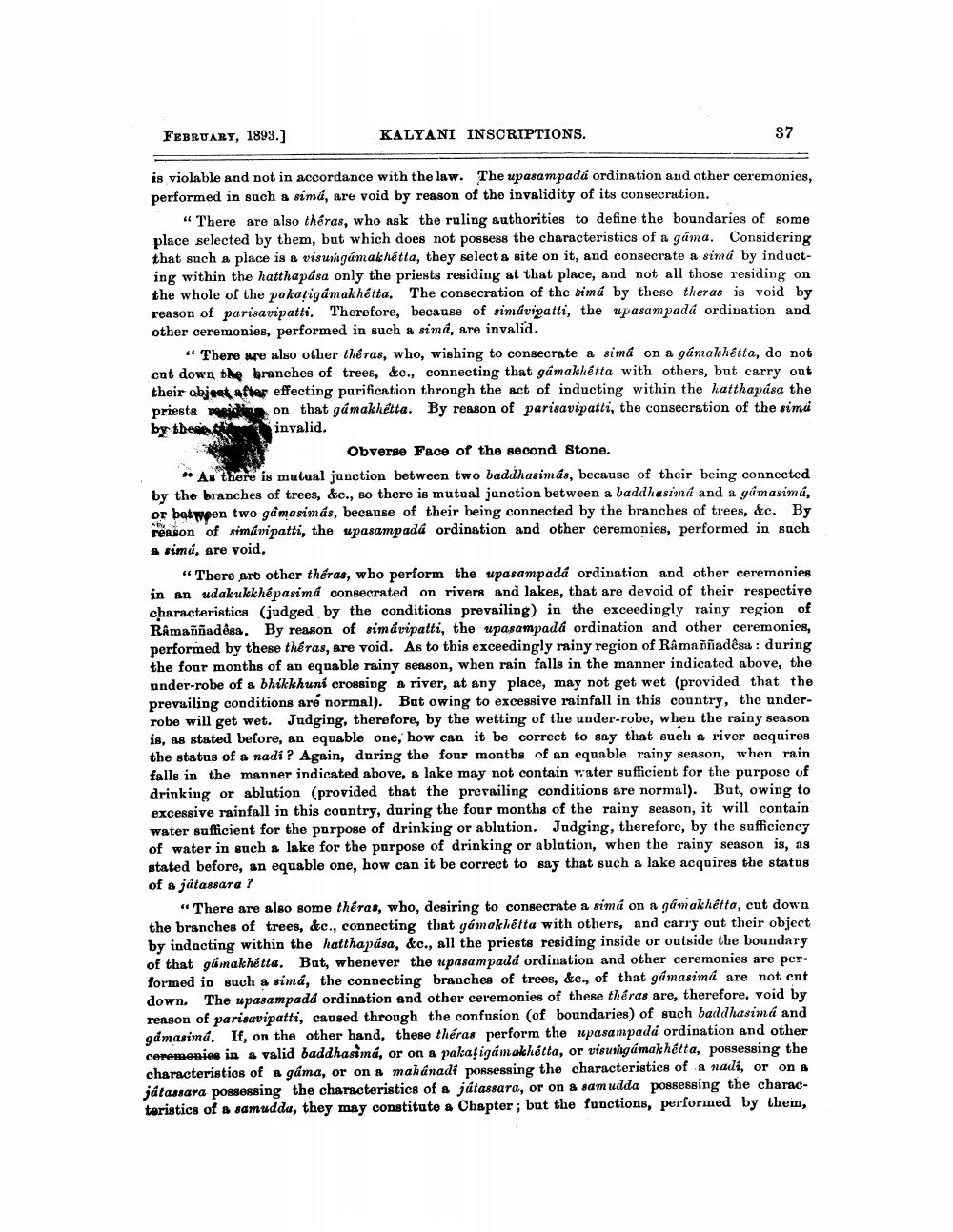________________
FEBRUARY, 1893.]
KALYANI INSCRIPTIONS.
37
is violable and not in accordance with the law. The upasampadá ordination and other ceremonies, performed in such a sima, are void by reason of the invalidity of its consecration.
“There are also théras, who ask the ruling authorities to define the boundaries of some place selected by them, but which does not possess the characteristics of a gáma. Considering that such a place is a visurigámakhêtta, they select a site on it, and consecrate a simá by inducting within the hatthapasa only the priests residing at that place, and not all those residing on the whole of the pakațigamakhétta. The consecration of the simá by these theras is void by reason of parisavipatti. Therefore, because of simávipatti, the upasampadá ordination and other ceremonies, performed in such a sima, are invalid.
"There are also other theras, who, wishing to consecrate a sima on a gámakhétta, do not ont down the branches of trees, &c., connecting that gámakhétta with others, but carry out their abjent after effecting purification through the act of inducting within the hatthapása the priests robe on that gámakhetta. By reason of parisavipatti, the consecration of the simu by themest i nyalid.
Obverse Face of the second Stone. As there is mutual junction between two baddhusimas, because of their being connected by the branches of trees, &c., so there is mutual junction between a baddhasimi and a gúmasima, or between two gamasimas, because of their being connected by the branches of trees, &c. By reason of simavipatti, the upasampadá ordination and other ceremonies, performed in such A simú, are void,
“There are other théras, who perform the upasampadá ordination and other ceremonies in an udakukkhépasimd consecrated on rivers and lakes, that are devoid of their respective characteristics (judged by the conditions prevailing) in the exceedingly rainy region of Ramaññadêsa. By reason of simávipatti, the upasampada ordination and other ceremonies, performed by these théras, are void. As to this exceedingly rainy region of Ramaññadêsa: during the four months of an equable rainy season, when rain falls in the manner indicated above, the ander-robe of a bhikkhuní crossing a river, at any place, may not get wet (provided that the prevailing conditions are normal). Bat owing to excessive rainfall in this country, the underrobe will get wet. Judging, therefore, by the wetting of the under-robo, when the rainy season is, as stated before, an equable one, how can it be correct to say that such a river acquires the status of a nadi? Again, during the four months of an equable rainy season, when rain falls in the manner indicated above, a lake may not contain water sufficient for the purpose of drinking or ablation (provided that the prevailing conditions are normal). But, owing to excessive rainfall in this country, during the four months of the rainy season, it will contain water sufficient for the purpose of drinking or ablution. Judging, therefore, by the sufficiency of water in such a lake for the purpose of drinking or ablution, when the rainy season is, as stated before, an equable one, how can it be correct to say that such a lake acquires the status of a játassara ?
“There are also some théras, who, desiring to consecrate a simá on a gámakhêtta, cut down the branches of trees, &c., connecting that gámak hétta with others, and carry out their object by inducting within the hatthapása, &c., all the priests residing inside or outside the bonndary of that gámakhétta. Bat, whenever the upasampadá ordination and other ceremonies are per. formed in such a simá, the connecting branches of trees, &c., of that gámasima are not cut down. The upasampadá ordination and other ceremonies of these théras are, therefore, void by reason of parisavipatti, caused through the confusion (of boundaries) of such baddhasimá and gámasimá. If, on the other hand, these théras perform the repasampadá ordination and other ceremonies in a valid baddhasimá, or on a pakaļigámokhátta, or visurigámak hétta, possessing the characteristios of a gáma, or on a mahanadi possessing the characteristics of a naii, or on a játassara possessing the characteristics of a játaseara, or on a samudda possessing the characteristics of a samudda, they may constitute a Chapter ; but the functions, performed by them,




